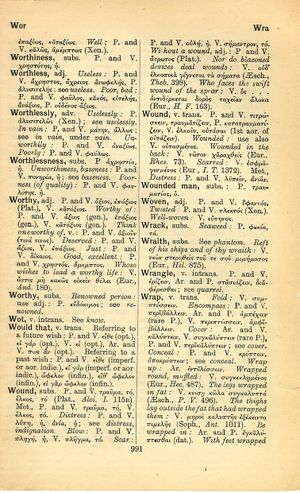wound: Difference between revisions
Βέλτιστε, μὴ τὸ κέρδος ἐν πᾶσι σκόπει → Amice, ubique lucra sectari cave → Mein bester Freund, sieh nicht in allem auf Profit
(Woodhouse 5) |
(CSV5) |
||
| Line 1: | Line 1: | ||
{{ | {{Woodhouse1 | ||
| | |Text=[[File:woodhouse_991.jpg|thumb|link={{filepath:woodhouse_991.jpg}}]]'''subs.''' | ||
P. and V. [[τραῦμα]], τό, [[ἕλκος]], τό (Plat., <b class="b2">Alci. I.</b> 115B). | |||
<b class="b2"></b>Met. P. and V. [[τραῦμα]], τό, V. [[ἕλκος]], τό. | |||
<b class="b2">Distress</b>: P. and V. [[λύπη]], ἡ, [[ἀνία]], ἡ; see [[distress]], [[indignation]]. | |||
<b class="b2">Blow</b>: P. and V. [[πληγή]], ἡ, V. [[πλῆγμα]], τό. | |||
<b class="b2">Scar</b>: P. and V. [[οὐλή]], ἡ. V. [[σήμαντρον]], τό. | |||
<b class="b2">Without a wound</b>, adj.: P. and V. [[ἄτρωτος]] (Plat.). | |||
<b class="b2">Nor do blazoned devices deal wounds</b>: V. οὐδʼ ἑλκοποιὰ γίγνεται τὰ σήματα (Aesch., <b class="b2">Theb.</b> 398). | |||
<b class="b2">Who faces the swift wound of the spear</b>: V. ὃς... ἀντιδέρκεται δορὸς ταχεῖαν ἄλοκα (Eur., <b class="b2">H. F.</b> 163). | |||
'''v. trans.''' | |||
P. and V. τιτρώσκειν, τραυματίζειν, P. κατατραυματίζειν, V. ἑλκοῦν, οὐτάσαι (1st aor. of οὐτάζειν). | |||
<b class="b2">Wounded</b>: use also V. οὐτασμένος. | |||
<b class="b2">Wounded in the back</b>: V. [[νῶτον]] χαραχθείς (Eur. ''Rhes.'' 73). | |||
<b class="b2">Scarred</b>: V. ἐσφραγισμένος (Eur., ''I. T.'' 1372). | |||
<b class="b2"></b>Met. <b class="b2">Distress</b>: P. and V. λυπεῖν, ἀνιᾶν. | |||
}} | }} | ||
Revision as of 10:09, 21 July 2017
English > Greek (Woodhouse)
subs.
P. and V. τραῦμα, τό, ἕλκος, τό (Plat., Alci. I. 115B).
Met. P. and V. τραῦμα, τό, V. ἕλκος, τό.
Distress: P. and V. λύπη, ἡ, ἀνία, ἡ; see distress, indignation.
Blow: P. and V. πληγή, ἡ, V. πλῆγμα, τό.
Scar: P. and V. οὐλή, ἡ. V. σήμαντρον, τό.
Without a wound, adj.: P. and V. ἄτρωτος (Plat.).
Nor do blazoned devices deal wounds: V. οὐδʼ ἑλκοποιὰ γίγνεται τὰ σήματα (Aesch., Theb. 398).
Who faces the swift wound of the spear: V. ὃς... ἀντιδέρκεται δορὸς ταχεῖαν ἄλοκα (Eur., H. F. 163).
v. trans.
P. and V. τιτρώσκειν, τραυματίζειν, P. κατατραυματίζειν, V. ἑλκοῦν, οὐτάσαι (1st aor. of οὐτάζειν).
Wounded: use also V. οὐτασμένος.
Wounded in the back: V. νῶτον χαραχθείς (Eur. Rhes. 73).
Scarred: V. ἐσφραγισμένος (Eur., I. T. 1372).
Met. Distress: P. and V. λυπεῖν, ἀνιᾶν.

